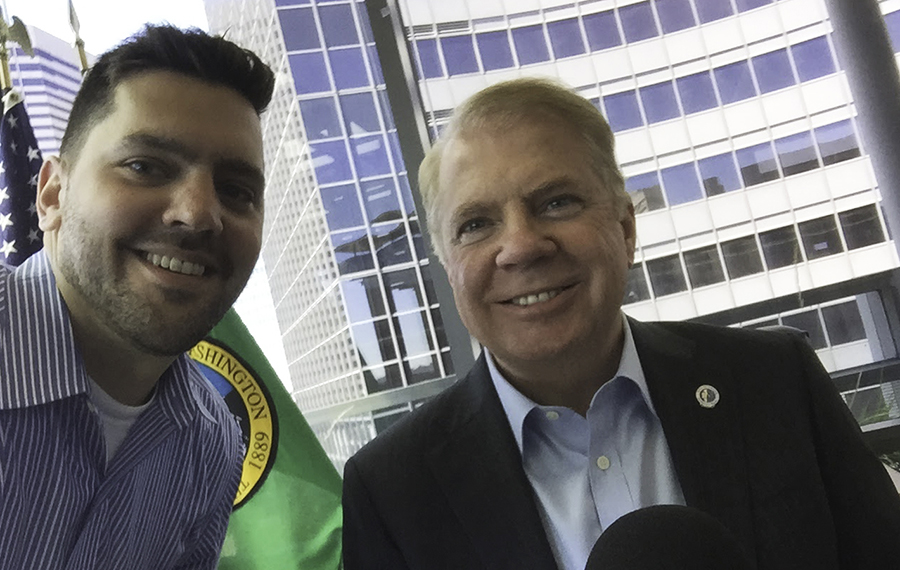Behind the scenes at the “Seattle Growth Podcast”

Jeff Shulman interviews Mayor Ed Murray for the Seattle Growth Podcast
Seattle is growing at clip not seen since the Gold Rush. And this growth is inducing enormous change on the city—as well as strong feelings and polarized opinions about how to address those changes.
Jeff Shulman, an associate professor of marketing at the Foster School, decided to investigate the issues by interviewing more than 100 Seattleites: from renters, home owners and the homeless to civic, corporate and cultural leaders. From these conversations he has produced the “Seattle Growth Podcast.” The 13-episode series explores how each aspect of the city’s transformation affects everyone who lives in the region.
The podcast has filled a need—and touched a nerve. The weekly series has attracted more than 20,000 downloads to date and inspired a live show on October 17 at the Impact Hub Seattle.
The Foster Blog recently sat down with Shulman to learn more about the project.
FB: What possessed you to pursue this project?
Shulman: Like many people in Seattle, I moved here for a job. I came to the UW ten years ago and lived in South Lake Union until four years ago. When I go back to my old neighborhood now, it’s completely unrecognizable. Things are changing so fast. And I wondered, how is the city responding to this growth and change?
Why did you decide to go with the podcast format?
I feel like we’re at an inflection point in Seattle, and it’s not clear what the city will become. Unfortunately, growth often produces polarizing conversations. So I wanted to facilitate a constructive dialog in which both sides of the issues could be discussed in depth, rather than in sound bites. I thought a podcast would allow people to express and hear long-form points of view. Then, we could better understand the challenges that everyone’s facing so we can begin working together to solve them.
How did the project get started?
I bought some recording equipment and took it into a neighborhood bar in the U District where I asked some people to talk to me about how Seattle’s growth is affecting them. Then I asked people waiting at the Tesla dealership and got different perspectives. I thought, I’m on to something. This gave me confidence to pursue interviews with key decision-makers in the city, too. As I interviewed all of these people, some key issues emerged: schools, transportation, housing affordability, homelessness, healthcare, emergency services, the city’s culture and character. So I decided to organize the interviews into 13 topical episodes.
How did you manage this with your day job as a professor?
Let’s just say that spring quarter (when I did most of the interviews) was really busy. I didn’t have to teach, but I did submit six articles for publication.
Was your background in academic research at all helpful?
There is a process to academic inquiry—where you seek both sides of an issue and really explore carefully rather than casually. And I think that translates fairly well to this project.
How would you describe your interview style?
As host, I try to stay as fly-on-the-wall as possible. I want to let my guests shine through, and that’s why I have included entire conversations. I want listeners to hear their words, not mine. I want people to form their own opinions.
You took a selfie with many of the people you interviewed. What was behind this ritual?
Sadly, I didn’t get a photo with everyone. But when I did ask them for a photo with me, I found it lightened the mood before the interviews and helped to create a great visual story of my journey.
Was there a most memorable interview?
One of my favorites was my conversation with a homeless man named Ty outside of City Hall (from Episode 3: Rising Homeless Population). Ty moved from Oklahoma to live on the streets of Seattle. He said that “he heard people were eating here so he brought his fork.” It turns out he didn’t just bring his fork, but also a positive attitude and a strong work ethic. Though he continues to sleep outside, Ty expresses gratitude for the opportunity to work in Seattle and vows to do what he can to improve his situation. He said he hopes Seattle will continue to provide opportunities for people to eat at all levels. It is a message of appreciation, hope and optimism. In my view, Ty’s story demonstrates the value of creating opportunities and giving people a chance to show what they can do.
What do you hope will come from the podcast?
I hope that people listen and really think about these issues from multiple perspectives so they become better informed. Then when it’s time to take action, they’ll think about the long-term payoff for the community. I’m also hoping to build a bridge between the Foster School and not just the business community, but the Seattle community at large. We’ve got a lot of brilliant people here. Having interacted with many of the city’s leaders, I think Foster can help tackle some of the city’s biggest challenges.
Should the tech sector take a more active role in helping Seattle manage the growth that it’s spurring?
Seattle tech companies are bringing people and prosperity to the city. But this growth is creating challenges that directly affect those firms’ continued ability to attract great employees—and their bottom lines. It’s going to be critical for tech leaders to join the conversation about the future of Seattle to ensure that the city continues to be an attractive place to live and work.
6:00-8:00pm
Impact Hub Seattle
220 2nd Ave South
Seattle, WA 98104
Register for event
